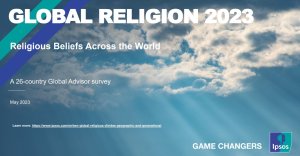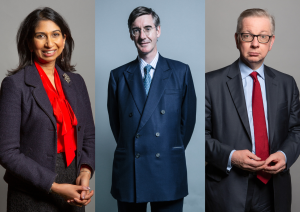Services funded by public money should be open to all, without alienating anyone.
The recent drive to contract out public services to faith groups risks undermining equal access.
Help us keep public services free from discrimination and evangelism.
The government is increasingly pushing for more publicly-funded services to be provided by religious organisations.
Many faith-based groups have carried out social service without imposing their beliefs. But religious groups taking over public service provision raises concerns regarding proselytising and discrimination.
65% of people have no confidence in church groups running crucial social provisions such as healthcare with only 2% of people expressing a lot of confidence.
Any organisations involved in delivering public services should be bound by equality law and restrictions on proselytisation.
Those advocating for faith organisations to take over more public services risk undermining these restrictions, which exist to protect both the public and third sector.
"We have concerns that some religious groups that seek to take over public services, particularly at local level, could pursue policies and practices that result in increased discrimination against marginalised groups, particularly in service provision and the employment of staff. Non-religious people and those not seen to confirm to the dominant ethos of a religious body, such as being in an unmarried relationship or divorced and being lesbian, gay, bisexual or transgendered, could find themselves subject to discrimination."
Unitarian Church (Submission to the Parliamentary Public Administration Select Committee about the Big Society agenda)
There are also concerns about faith-based mental health and pastoral care in public institutions, including chaplaincy programmes in the NHS and the armed forces. Where such services are funded by the state, they should not be organised around religion or belief.
Religious commentators are often keen to document the contribution of religious organisations to the third sector and social activism. But they fail to demonstrate why it should be the state's role to build this capacity or why local authorities shouldn't have legitimate concerns about religious groups running services.
Take Action!
1. Write to your MP
Ask your MP to protect secular public services.
2. Share your story
Tell us why you support this campaign, and how you are personally affected by the issue. You can also let us know if you would like assistance with a particular issue.
3. Join the National Secular Society
Become a member of the National Secular Society today! Together, we can separate religion and state for greater freedom and fairness.
Latest updates
Study: Brits wary of religion but at ease with religious difference
Posted: Fri, 12 May 2023 15:17
People in Great Britain are increasingly wary of religion yet comfortable with people belonging to different religions, figures suggest.
A new survey on global religion by Ipsos found 66% of British people agree with the statement: "Religion does more harm in the world than good".
This is the third highest percentage of all 26 countries surveyed, after India and Sweden. It has increased by 4% since 2017. The average across the 26 countries is 47%.
But the figures also indicate Brits have become more tolerant of religious difference. Eighty-eight per cent agree with the statement "I am completely comfortable being around people who have different religious beliefs than me".
This percentage, one of the highest among the countries surveyed, is the same as other countries in the Anglosphere and has increased by 3% over the last six years.
British people are also largely tolerant of nonreligious people. Only 15% agreed with the statement: "I lose respect for people when I find out that they do not have a religious faith".
And less than three in ten Brits (27%) agree that "people with a religious faith are better citizens".
However, both figures have increased by 5% since 2017, suggesting tolerance for irreligion may be waning. Those in the Gen Z demographic were considerably more likely to hold these views than baby boomers.
Most Brits don't pray and don't see religion as important for citizenship or happiness
Ipsos found there is an almost 50:50 split between religious and nonreligious people in Britain, with 48% identifying with a religion (39% Christian, 6% Muslim and 3% other religions) and 48% with no religion. The remaining 4% preferred not to say.
Ipsos' findings are largely consistent with the 2021 Census of England and Wales, which found 38% of people have no religion, while 46% are Christian and 6.5% are Muslim.
Other figures in the Ipsos report suggest that religion does not play a major role in the lives of most Brits. Only 18% pray at least once a month at a place of worship and 25% pray outside a place of worship (for example, at home).
However, the percentage of Gen Zers who pray in either setting is higher than for than Boomers. They are also more likely to believe in God. Ipsos said this reflects a global trend in which countries where young people are more likely to be Muslim, they are also more likely to to view their religion as a marker of their identity, and to associate religion with morality.
The 2021 Census found Islam is the youngest religion or belief group in England and Wales, while Christianity is the oldest.
Less than half of Brits agree that their religion defines them as a person (27%) or that people with a religious faith are happier (39%).
Ipsos said globally, the percentage who say religious people are happier tends to mirror the percentage who regularly attend a place of worship. Additionally, the higher the proportion of believers in a country, the more likely believers are to feel they benefit from their faith, Ipsos found.
NSS: Politicians should refrain from divisive pro-religion rhetoric
Megan Manson, head of campaigns at the National Secular Society, said: "Pro-religion politicians and religious leaders alike frequently use the argument that religion makes people happier or better citizens to push for more religion in public affairs.
"But this survey reveals most Brits feel very differently. They think religion causes more harm than good, and that religious and nonreligious people are equally worthy of respect. This should be reflected in policy on religion and society.
"It is heartening to see that despite their critical views on religion, most Brits are very comfortable with people of different religions and beliefs.
"But the slight decline of tolerance, especially among young people, for those with no religion is cause for concern. That's why politicians should refrain from rhetoric which implies religious people are somehow better than the nonreligious. Not only is such rhetoric untrue – it can cause needless division and prejudice in an otherwise tolerant Britain."
Cabinet ministers to speak at Christian nationalist conference
Posted: Tue, 9 May 2023 08:17
The National Secular Society has expressed alarm over plans for cabinet ministers to speak alongside anti-LGBT campaigners at a conference organised by Christian nationalists.
Home Secretary Suella Braverman MP and Communities minister Michael Gove MP will deliver keynote speeches at the National Conservativism conference (NatCon) in London next week, according to the conference website.
Other MPs and peers, including former minister Jacob Rees-Mogg MP, are also confirmed as attending as speakers.
NatCon is based on a 'Statement of Principles' which asserts "public life should be rooted in Christianity" where a "Christian majority" exists.
The Statement of Principles adds that no nation "can long endure without humility and gratitude before God and fear of his judgment" and that for millennia "the Bible has been our surest guide" to "public morals" and "political traditions". Christianity's "moral vision", it says, should be "honoured by the state and other institutions both public and private".
It also appears to reject same-sex relationships, stating "the traditional family" is built around a "bond between a man and a woman" and is "the source of society's virtues".
The Statement of Principles embodies many characteristics of Christian nationalism. The Christian nationalist movement in the US, which saw a rise during the Trump administration, holds that the US is meant to be a Christian nation. Christian nationalist campaigners have been linked to the revocation of the right to an abortion and the January 2021 attack on the Capitol.
The conference is organised by the Edmund Burke Foundation, a US group with the aim of "strengthening the principles of national conservatism in Western and other democratic countries".
Same sex marriage is "a really bad social experiment"
Speakers at this year's conference include Kevin Roberts, head of the right-wing US think tank The Heritage Foundation. In an interview with the New York Post, Roberts set out his desire to repeal the constitutional right to same-sex marriage in the US: "We would like to see a court case go up to the Supreme Court and completely tear out, root and branch, Obergefell."
Asked if that would mean existing same-sex marriages would have to be annulled, Roberts replied: "I hope so. That would be good for civil society". He described same-sex marriage as "a really bad social experiment that we're only beginning to see the rotten fruit of" and claimed the effects of children raised in such families are "negative."
Christian group "has contended that LGBTQ people are more likely to engage in paedophilia"
Lois McLatchie, spokesperson of Alliance Defending Freedom (ADF) UK, a Christian activism group will also be in attendance. ADF-UK is an 2018 offshoot of the US based ADF, which according to the Southern Poverty Law Center has "supported the recriminalisation of sexual acts between consenting LGBTQ adults in the U.S. and criminalization abroad; has defended state-sanctioned sterilization of trans people abroad; has contended that LGBTQ people are more likely to engage in paedophilia; and claims that a 'homosexual agenda' will destroy Christianity and society."
ADF also seeks to "recover the robust Christendomic theology of the 3rd, 4th, and 5th centuries".
An investigation by openDemocracy found ADF had spent more than £410,000 in the UK between 2017 and 2019.
Ohio Senator J.D. Vance, who said the 2020 US election was "stolen", will also speak.
Previous speakers: Tucker Carlson and Josh Hawley
Previous conference speakers include former Fox News presenter Tucker Carlson, who once described Iraqis as "semi-literate primitive monkeys" and has said immigrants make the US "dirtier". Senator Josh Hawley, who raised objections to certifying the electoral college count in the 2020 US election, has also spoken at NatCon.
NSS: 'Ministers should think carefully about sharing a stage with virulent homophobes'
NSS campaigns officer Alejandro Sanchez said: "It is alarming to see ministers headlining a conference to promote Christian nationalism.
"As we've seen from its rise in the US, Christian nationalism is corrosive to the principles of secular democracy. It puts theology at the heart of policy-making, making those of other religions and beliefs second-class citizens and stripping LGBT people of basic rights.
"We should be working to disentangle church from state in the UK to guarantee equality for all citizens of every religion or belief. Politicians aligning themselves with Christian nationalists will further entrench Christian privilege in our state, as well as putting the rights of LGBT people, women and non-Christians at risk.
"The government should think carefully about whether it wishes to lend this conference credibility by having senior cabinet ministers in attendance."




